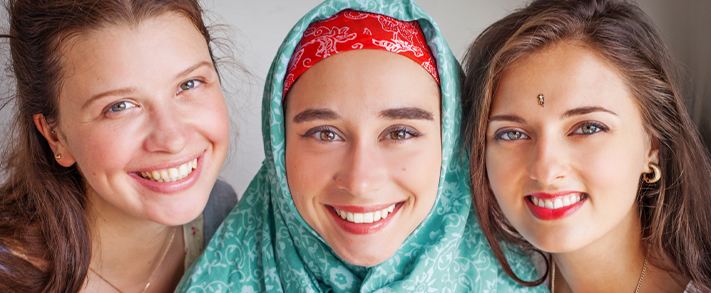
Women have played an important role in the development of various religions around the world from Hinduism to Christianity, and the way in which women are treated in religions such as Islam is still an area of debate for many.
Christianity
The mother of Jesus Christ, the Virgin Mary, is perhaps the most high profile female figure in Christianity, and women are significant figures within the Bible.
In Christian society women have traditionally been placed in a subordinate role within the church and within marriage itself.
Historically Christian societies in Western Europe have not allowed women to take on senior roles within the church and have promoted the idea that women are meant to fulfill a more submissive role within their families.
This is certainly the case amongst more conservative Christians and is particularly prevalent amongst American Evangelical Christians.
In the last 50 years it has become more common for females to be ordained as priests and bishops within different Christian denominations such as the Protestant Church.
The Catholic Church is perhaps the most significant church that does not allow women to become religious leaders and as in other areas of society, progress in women’s rights has encouraged debate in religious communities as to the place of women within their religion.
Islam
Within Islam women are not allowed to become an imam and take a religious service.
Within Western society and the Western media there is a generally negative perception of the treatment of women in Islamic society.
This negative perception has arguably been heavily influenced by the conflict with the Taliban in Afghanistan and the strict laws regarding women in that particular country.
To those unfamiliar with Islam, this strict interpretation of religion that prevents women from going to school and required them to wear a burqa appears uncivilised and repressive.
Islamic law does instruct women to dress modestly to discourage being viewed in sexual nature, and men and women are segregated in places of worship.
It is certainly true that there are differences between the rights and roles of men and women that are set out within Islamic law, and coupled with a lack of real understanding of the religion amongst many in the West, Islamic treatment of women is often characterised as extremely repressive.
Feminism and religion
There is no doubt that the rise in feminism during the second half of the 20th century had a direct influence on the increased number of women being allowed to become religious leaders such as priests and bishops.
Religion has not been exempt from the widespread improvement in the representation of women throughout society.
As with other issues concerning women in positions of power, there is opposition amongst those who have more traditional views as to the role of a woman.